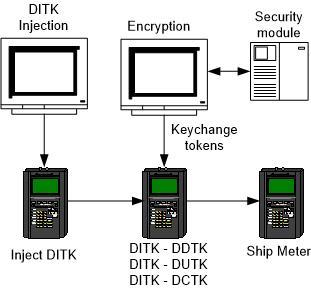KEY TYPE (KT), KEY TYPE CODE (KTC)
There are various key types defined in the IEC62055-41 specification. These are shown below:
Key type 0 (Initialization key)
The initialization key's primary use is for the manufacture of payment meters. This key is the only key that is visible in plain text. It is known only to the manufacturer of the payment meters (and is chosen by the manufacturer, and not allocated).The designation of this key type is DITK (DecoderInitializationTransferKey). The definition for his key type may be found in IEC62055-41.
Usage:
The DITK is inserted into the payment meter at the time of manufacture by a method specified by the manufacturer to suit the manufacturing process. The Security Module used for manufacture is coded with this DITK for onward key-change operations. Once a meter has been manufactured, it is key-changed from the DITK to a decoder key based on either a Default Supply Group Code, or a Vending Supply Group Code.
No payment meter must leave the manufacturing facility coded with a DITK.
All token types are accepted by a meter loaded with a DITK.
The DITK is inserted into the payment meter at the time of manufacture by a method specified by the manufacturer to suit the manufacturing process. The Security Module used for manufacture is coded with this DITK for onward key-change operations. Once a meter has been manufactured, it is key-changed from the DITK to a decoder key based on either a Default Supply Group Code, or a Vending Supply Group Code.
No payment meter must leave the manufacturing facility coded with a DITK.
All token types are accepted by a meter loaded with a DITK.
Typical manufacturing process:

Key type 1 (default key)
The default key's primary use is for the restoration of a payment meter to a default key, or for the shipping of the payment meter to a customer in a key state which is safe for storage. Normally, meters stored in a bulk storage would be coded to a default key and key-changed to a unique or common key type once their destination is known.The designation of this key type is DDTK (DecoderDefaultTransferKey). The definition for his key type may be found in IEC62055-41.
Usage:
The DDTK is inserted into the payment meter at the time of manufacture by means of a key-change operation. The Security Module used for manufacture is coded with the vending key required to generate this DDTK. Once a meter has been manufactured, it is key-changed from the DITK to either a Default Supply Group Code, or a Vending Supply Group Code. if the customer requires the meters shipped in a default state, then the key-change operation at this point will be from a DITK to a DDTK.
All token types except credit tokens are accepted by a meter loaded with a DDTK.
Key type 2 (unique key)
The Unique key's primary use is for the coding of payment meters. This key is never visible in plain text, and is not known to the manufacturer of the payment meters.The designation of this key type is DUTK (DecoderUniqueTransferKey). The definition for his key type may be found in IEC62055-41.
Usage:
The DUTK is inserted into the payment meter at the time of manufacture, or at the customer's premises, via a key-change token set. The Security Module used for manufacture is coded with a vending key used to generate this DUTK. Once a meter has been manufactured, it may be key-changed from the DITK to a Vending Supply Group Code containing a DUTK.
All token types are accepted by a meter loaded with a DUTK.
Key type 3 (common key)
The Common key's primary use is for the coding of payment meters. This key is never visible in plain text, and is not known to the manufacturer of the payment meters.The designation of this key type is DCTK (DecoderCommonTransferKey). The definition for his key type may be found in IEC62055-41.
Usage:
The DCTK is inserted into the payment meter at the time of manufacture. The Security Module used for manufacture is coded with this DCTK. Once a meter has been manufactured, it is key-changed from the DITK to the DCTK.
All token types are accepted by a meter loaded with a DCTK.
